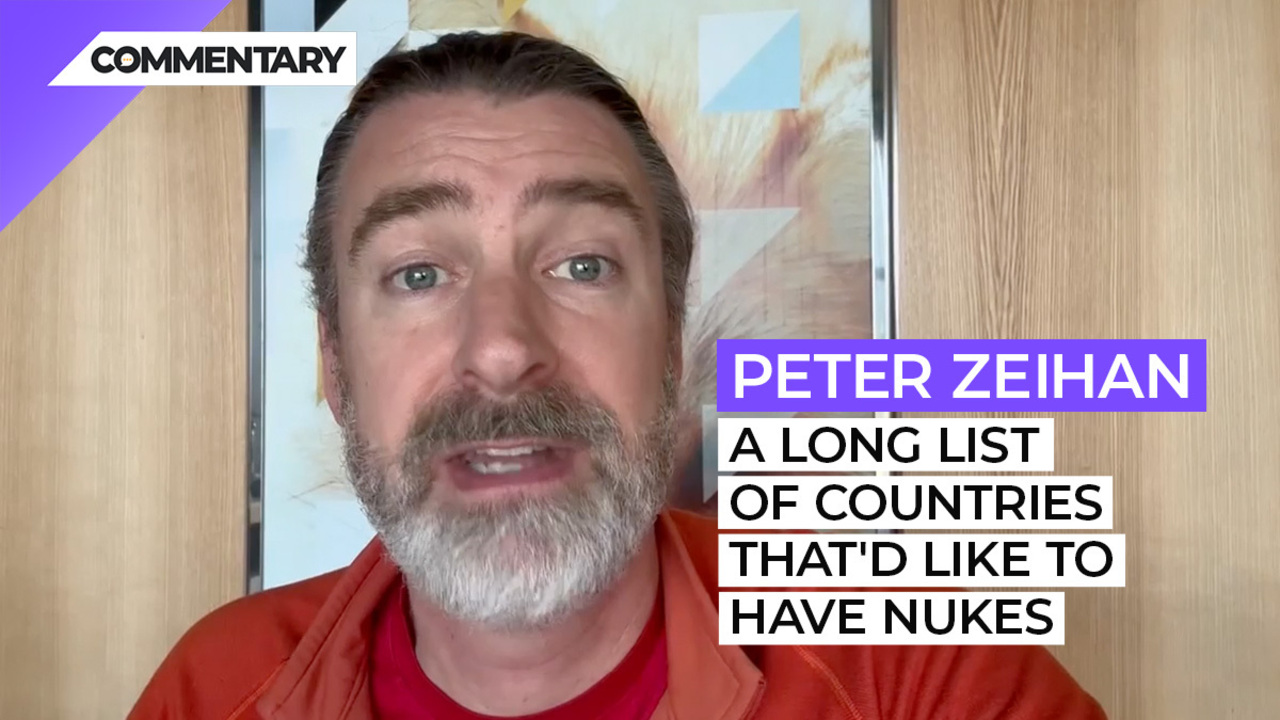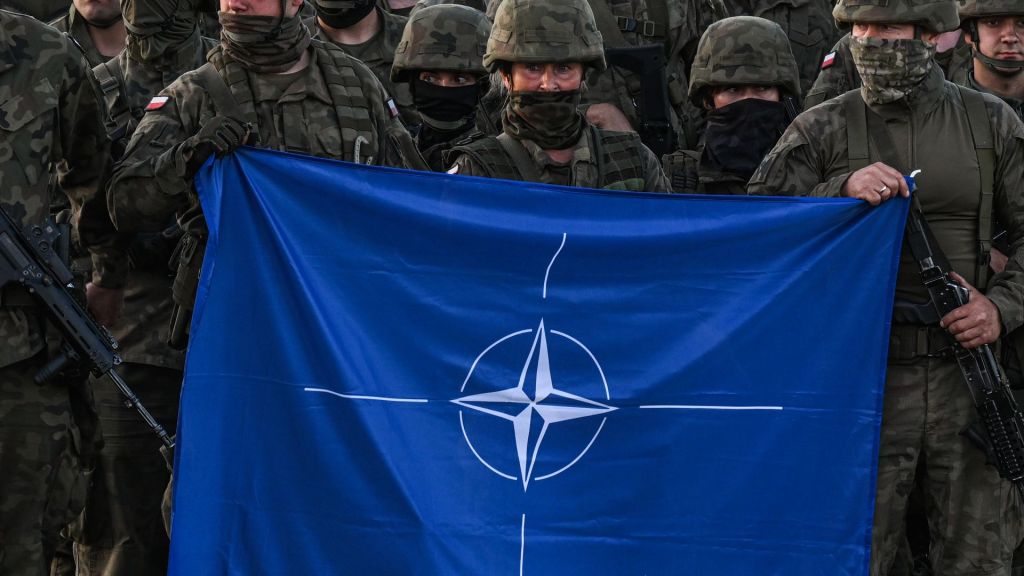
Commentary
-
Our commentary partners will help you reach your own conclusions on complex topics.
Hey everybody, Peter Zeihan coming to you from an exciting hotel room back on January 12. So Wednesday of the last week, it might be two weeks by the time you finally see this, who knows — the North Korean president said that we they were keeping nuclear weapons as a possibility on the table for future strategic development. Now, this is a big no no — just kind of publicly flirting with the idea of like, yeah, we might go nuclear, especially if the word Korea is involved. But you have to look at it from their point of view.
The United States has changed the way its military works back during the Cold War, when there really wasn’t any other naval power out there. The United States maintains a relatively large destroyer fleet. And in doing so we were able to patrol the global oceans for everyone with the Cold War ended in 89. And the Soviet system collapsed.
And in 1992, the world went different ways. And we saw a number of secondary powers start to rise, you know, your Chinas, your Brazils, your Indias and so on. And the United States kind of declared that history was over. And I thought that the only strategic policy that we would need is to have a hammer to take out any country that might challenge what the post-WW2 post-Cold War order might be. And in that sort of scenario, we changed the way our military worked. So we started having fewer destroyers and more aircraft carrier battle groups.
So it was less about preserving the peace that we now thought had been achieved. And instead about making sure we had the military capacity to challenge anyone who would try to stick a knife in the eye of the system. At the same time, all the secondary powers started to have their own security policies independent of Cold War norms. And a number of countries started building out their navies with China being at the very top of that list. So even if the United States could stomach the political cost of being involved in the world of being the global policeman, I would argue that the United States is no longer in a position where the balance of forces allows it to create an environment that’s safe for global commerce. US naval power is stronger than it’s ever been. But it’s also more concentrated than it’s ever been. And ultimately, if you want the tens of thousands of tankers and container ships, that ply the oceans every day to be able to pick up and drop off cargo wherever they need to the 80 destroyers that the United States has now just don’t cut it, they probably wouldn’t have even cut it during the Cold War. And so instead, countries are starting to look at their own security environment and making decisions about whether they need to take independent action because they don’t find that the United States’ security guarantees are worth what they used to be. And that’s before you consider that they probably aren’t worth what they used to be because the United States is moving on.
So South Korea is a country that clearly has a security need. It’s sandwiched between North Korea, Japan and China, all countries that it considers rivals to a certain degree. And it is the weakest military power of the four. Having nukes would be the great equalizer. And the Koreans have had nuclear civilian power for decades. They’re certainly technologically competent, and I have no doubt that would only take a few days, two weeks for the South Koreans to build a crude nuclear device if they wanted to, and a deliverable weapon system in under a year, well within their capacity. And this is hardly a conversation that should be limited to South Korea. If you’re going to consider the cost economically, strategically, diplomatically of going nuclear, you have to have two things. Number one, the technical capacity to build it out yourself. And number two, a strong strategic overriding reason to take the risk in the first place.
Korea checks both columns very, very firmly, but so does Japan. And so especially does Taiwan. And there’s no surprise here that this has shaped strategic realities for the Chinese when it comes to Taiwan.
The unofficial battle plan for the Chinese if they ever do decide they want to pull the trigger on Taiwan is not to do a slow buildup over weeks like the Russians did when they were getting ready to attack Ukraine last February. Now the Taiwanese would see that and they would use that time to build a few deliverable nuclear systems. And so the only way that Taiwan could theoretically fall is if it came at the loss of several Chinese cities. So the unofficial plan in Beijing is to basically text all their soldiers, tell them to run to the closest port, hijack a fishing vessel and just set sail.
You know, you’ll have a million casualties simply crossing the Taiwan Strait, but at least you don’t lose a city that way. Outside of East Asia, there’s plenty of others who kind of fall into the same two categories. If you’re looking at any one on the Russian periphery, obviously Ukraine wishes they had nukes at the moment. But if the West is proves to be in sufficiently united in dealing with whatever comes next in the Ukraine war, I can absolutely see an environment where Finland and Sweden and Poland all go nuclear. They all have the technology, they certainly all have the need. You could even toss Romania into that group. But the big one, the one that will really change everyone’s strategic calculus is Germany, because any post-Ukraine world where the Russians look strong, is one where the Germans know that in the end, they’re going to be fighting the Russians on the plains of Poland.
And since the Germans have spent the last 60 years disarming, they absolutely do not have the middle of military industrial plant in a short period of time, in order to face down the Russians and number. The only way that they can buy time is by going nuclear. One final country to kind of toss into this mix and that is Saudi Arabia. It’s not that the Saudis have the technical capacity to go nuclear. I mean, what are they going to do, rub two molecules of oil together to get fission? No, but they do have really deep pockets. And I can totally see them walking into Islam and Pakistan and writing a check and walking out with a few nuclear weapons. We are nearing a point, again, with the United States no longer being involved in the region, we’ve withdrawn from the Middle East pretty much completely. We’re nearing a point where the Saudis and the Iranians are going to be having a direct confrontation in the not too distant future. And when that happens, the Saudis can either take their fat lazy population with absolutely no military skills and line them up in the desert and hope that that’s enough. Or they can use the Air Force which is okay and hope that bombing the advancing Iranian forces is enough. Or they can brandish a nuke. So, bottom line, the countries that are most likely to go nuclear in the next several years are not the normal candidates. But the rationale stays the same. You go for nukes if you don’t think you can win a conventional conflict. And the list of countries who can’t win a conventional conflict but have the capacity of going nuclear is a lot longer than everyone should honestly be comfortable with. Alright, that’s it for me. Until next time.
-
Hurricane Helene hits US coast, Appalachia and beyond
Hurricane Helene hit Florida and Georgia overnight between Sept. 26 and 27 as a Category 4 hurricane, and accompanying storms will continue reaching deeper into the continental United States today. Dangerous flash flooding from the hurricane, known as storm surge, was some of the worst flooding that the Tampa Bay area has ever seen, and… -
Israel holds upper hand against Lebanon, Hezbollah and Iran
On Wednesday, Sept. 25, Hezbollah launched a ballistic missile at Tel Aviv in retaliation for Israel’s explosive pager attack that blew up devices across Lebanon. Although Israel’s defense systems intercepted the surface-to-surface missile, the attempted strike on Tel Aviv marked a significant escalation by Hezbollah. Since the siege on Gaza began, shortly after the Oct. 7, 2023,… -
The Sinaloa Cartel civil war
Fears of a civil war within the Sinaloa Cartel are growing as violence between competing factions within the cartel continues. The Mexican Army has dispatched around 600 elite troops to Sinaloa to help quell those fears, in addition to roughly 2,200 regular soldiers and National Guard. Watch the above video as Straight Arrow News contributor… -
New Ukrainian weapons hit Russia where it hurts
Ukrainian drones struck a major Russian ammunition depot, triggering a massive explosion that was captured on camera. According to the Ukrainian military, 2,000 tons of munitions had arrived at the depot before the attack. Over the past two years, Ukraine has significantly increased its domestic drone production, allowing it to scale up attacks on military… -
Weighing social costs vs. economic benefits on immigration
Global human migration is one of the defining elements of our current historical era, according to the United Nations. Migrants face both the incentives to leave — forced out by climate change, crime and corruption, extreme poverty or violence — and incentives for where to go, based on available job opportunities and so on. Migration…
Latest Stories
-
 Getty Images
Getty Images
Jay-Z sues sexual assault accuser and lawyer, says Roc Nation lost $20 million
-
 Getty Images
Getty Images
Democrats want DOJ attorney who dropped Eric Adams case investigated
-
 Getty Images
Getty Images
Millions of users’ personal data shared with US law enforcement: Report
-
 Getty Images
Getty Images
Republican leaders urge a pause on town hall meetings
-
 Getty Images
Getty Images
Media spins Trump, Zelenskyy Oval Office meeting: Bias Breakdown
Popular Opinions
-
In addition to the facts, we believe it’s vital to hear perspectives from all sides of the political spectrum.
Latest Opinions
In addition to the facts, we believe it’s vital to hear perspectives from all sides of the political spectrum. We hope these different voices will help you reach your own conclusions.
The opinions published in this section are solely those of the contributors and do not reflect the views of Straight Arrow News.





















Latest Commentary
We know it is important to hear from a diverse range of observers on the complex topics we face and believe our commentary partners will help you reach your own conclusions.
The commentaries published in this section are solely those of the contributors and do not reflect the views of Straight Arrow News.
Dr. Frank Luntz
Pollster and Political Analyst‘Biased’: What Americans think of ‘mainstream media’
‘Getting rid of them’: Americans discuss Trump and immigration
‘Woke’: Why some Biden 2020 voters backed Trump in 2024